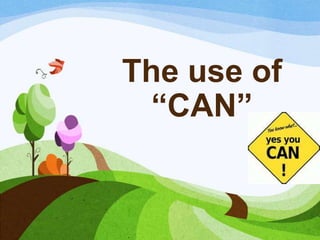
Learn How to Use Modal Verb "CAN
- 2. Objective • In this activity you will know about the use of the modal can. To give you a better idea you will find some examples and at the end some exercises which help you to practice what you have learned.
- 3. Can (for possibility) • "Can" is one of the most commonly used modal verbs in English. It can be used to express ability or opportunity, to request or offer permission, and to show possibility or impossibility.
- 4. I can snowboard Examples: Positive form
- 5. I can
- 13. Look at the following picture.
- 14. Now write one sentences for each ability.(use the positive, negative and interrogative form. • 1.___________________________________________ ____ • 2.___________________________________________ ____ • 3.___________________________________________ ____ • 4.___________________________________________ ____ • 5.___________________________________________ _____ • 6.___________________________________________
- 15. • If you have any question, please do not hesitate to send me your doubts to • silviaguadaluperamirezgonzalez@gmail.com
